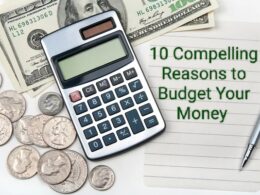Are you wondering whether $1,000 a month is a good amount of money? Maybe you’re trying to supplement your income or just curious about how far an extra $1,000 can go.
Whatever your reason, you’re not alone. Many people struggle with financial stability and the idea of earning an extra $1,000 a month can seem daunting. You may be worried about the time commitment or unsure if it’s even worth it.
But fear not, we’re here to help. In this article, we’ll explore the pros and cons of earning an extra $1,000 a month and provide you with 26 ways to make it happen.
After reading this article, you’ll have a better understanding of whether $1,000 a month is good for you and how to achieve it. So, let’s dive in with confidence and explore the possibilities!
Is $1000 Per Month Good?
When it comes to determining whether $1000 per month is good, there are several factors to consider.
Factors to Consider
Income
For someone who is earning minimum wage and working full-time, $1000 per month may not be enough to cover all of their expenses. However, for someone who is earning a higher income and has lower expenses, $1000 per month could be a significant amount of extra money to put towards savings or investments.
Rent
The cost of rent can vary greatly depending on location and living situation. In some areas, $1000 per month may be enough to cover rent for a small apartment or shared living space. In other areas, $1000 per month may not even cover a portion of rent for a single bedroom.
Food
The cost of food can also vary depending on location and dietary preferences. For someone who cooks at home and shops for groceries carefully, $1000 per month could cover all of their food expenses. However, for someone who eats out frequently or has dietary restrictions that require more expensive food items, $1000 per month may not be enough.
Utilities
Utilities such as electricity, water, and internet can add up quickly. Depending on the location and living situation, $1000 per month may be enough to cover all utility expenses or may only cover a portion.
Editor
For freelance writers or editors, $1000 per month could be a good amount of income for part-time work. However, for full-time editors, $1000 per month may not be enough to cover all of their expenses.
Consumer
For someone who enjoys shopping or has expensive hobbies, $1000 per month may not be enough to cover their spending habits. However, for someone who is more frugal or doesn’t have many expenses, $1000 per month could be a significant amount of extra money.
Overall, whether $1000 per month is considered good or not depends on the individual’s income, expenses, and lifestyle.
Savings and Investing
Saving Strategies
Saving money is an important aspect of financial planning. It is crucial to have a sound saving strategy to achieve financial stability. One popular guideline is the 50/30/20 budget, which recommends allocating 50% of your monthly income towards necessities, 30% towards wants, and 20% towards savings and debt repayment.
Another saving strategy is to set a savings goal and work towards it. For instance, if someone wants to save $1000 per month, they can set up an automatic transfer from their checking account to their savings account. This way, they can save money consistently without having to think about it.
Investment Options
Investing is a great way to grow wealth over time. There are several investment options available, including stocks, bonds, mutual funds, and exchange-traded funds (ETFs).
One popular investment option is a Roth IRA. This retirement account allows individuals to contribute after-tax dollars, which can grow tax-free. Withdrawals from a Roth IRA are also tax-free, making it an attractive option for retirement savings.
Another popular investment option is a 401(k) retirement account. Many employers offer 401(k) plans, which allow employees to contribute a portion of their pre-tax income towards retirement savings. Employers may also offer matching contributions, which can help employees save even more for retirement.
When it comes to investing, it is important to consider the impact of inflation and interest rates. Inflation can erode the value of investments over time, while interest rates can impact the returns on investments.
It is also important to diversify investments across different asset classes and sectors to reduce risk. Vanguard and Schwab are two popular investment firms that offer a wide range of investment options.
Finally, it is important to remember the power of compound interest. By reinvesting dividends and interest, investors can grow their wealth exponentially over time.
Overall, saving and investing are important components of financial planning. By following a sound saving strategy and investing in diverse assets, individuals can achieve their financial goals and secure their future.
Living on $1000 Per Month
Living on a budget of $1000 per month can be challenging, but it is possible with careful planning and frugal living. Here are some tips to help make it work:
Budgeting Tips
Creating a budget is essential when living on a limited income. Here are some budgeting tips to help stretch that $1000:
- Track expenses: Keep track of all expenses for a month to get an idea of where money is going.
- Prioritize: Prioritize essential expenses such as rent, utilities, food, and transportation.
- Cut back on non-essentials: Cut back on non-essential expenses like dining out, entertainment, and shopping.
- Plan meals: Plan meals ahead of time and shop for groceries on a budget.
- Save on utilities: Save on utilities by turning off lights and unplugging electronics when not in use.
Frugal Living
Frugal living is essential when living on a limited income. Here are some frugal living tips to help make that $1000 go further:
- Shop smart: Shop at discount stores, thrift stores, and garage sales for clothing, furniture, and household items.
- DIY: Do-it-yourself projects can save money on home repairs and renovations.
- Cook at home: Cooking meals at home is cheaper than dining out.
- Use public transportation: Using public transportation is cheaper than owning a car.
- Find free entertainment: Look for free entertainment options such as parks, libraries, and community events.
By following these budgeting and frugal living tips, it is possible to live on $1000 per month. It may require some sacrifices, but it is possible to live a comfortable and fulfilling life on a limited income.
Frequently Asked Questions
Can you survive on $1000 a month?
Surviving on $1000 a month can be challenging, but it is possible. It requires careful budgeting and prioritizing of expenses. One may need to make sacrifices such as living in a less expensive area, preparing meals at home instead of eating out, and cutting back on non-essential expenses.
Is $1000 a month a livable wage?
$1000 a month may not be considered a livable wage in many parts of the world. It may be enough to cover basic necessities such as food, shelter, and utilities, but it may not leave much room for unexpected expenses or savings.
Is $1000 a month a good salary?
$1000 a month may not be considered a good salary, especially if one has dependents or significant financial obligations. It may be enough to cover basic expenses, but it may not leave much room for discretionary spending or saving for the future.
Can you pay bills on $1000 a month?
Paying bills on $1000 a month can be challenging, but it is possible with careful budgeting and prioritizing of expenses. One may need to negotiate payment plans with creditors or seek assistance from government programs or charitable organizations.
What is the minimum amount needed to live on $1000 a month?
The minimum amount needed to live on $1000 a month will vary depending on factors such as location, lifestyle, and family size. It may be possible to cover basic necessities such as food, shelter, and utilities, but it may not leave much room for unexpected expenses or savings.
Conclusion
For those living in areas with a lower cost of living, $1000 a month may be sufficient to cover rent, utilities, food, and other basic necessities. However, in more expensive cities, such as New York or San Francisco, $1000 may not even cover rent for a small apartment. In addition, those with dependents or medical expenses may find it difficult to make ends meet with only $1000 a month.
Ultimately, whether $1000 a month is considered good depends on individual circumstances. It may be a starting point for those just starting out or a temporary solution for those experiencing financial difficulties. However, for those with long-term financial goals, it may not be enough to achieve financial stability and security.
YOU SHOULD ALSO READ:
- What Are Best Ways to Break $100 for Change?
- Why Do I Want to Spend Money All the Time?
- 25 Timeless Old-Fashioned Frugal Living Tips
- How to Be Frugal Without Being Cheap
- How To Budget Monthly With Biweekly Pay: 10 Tips and Strategies











